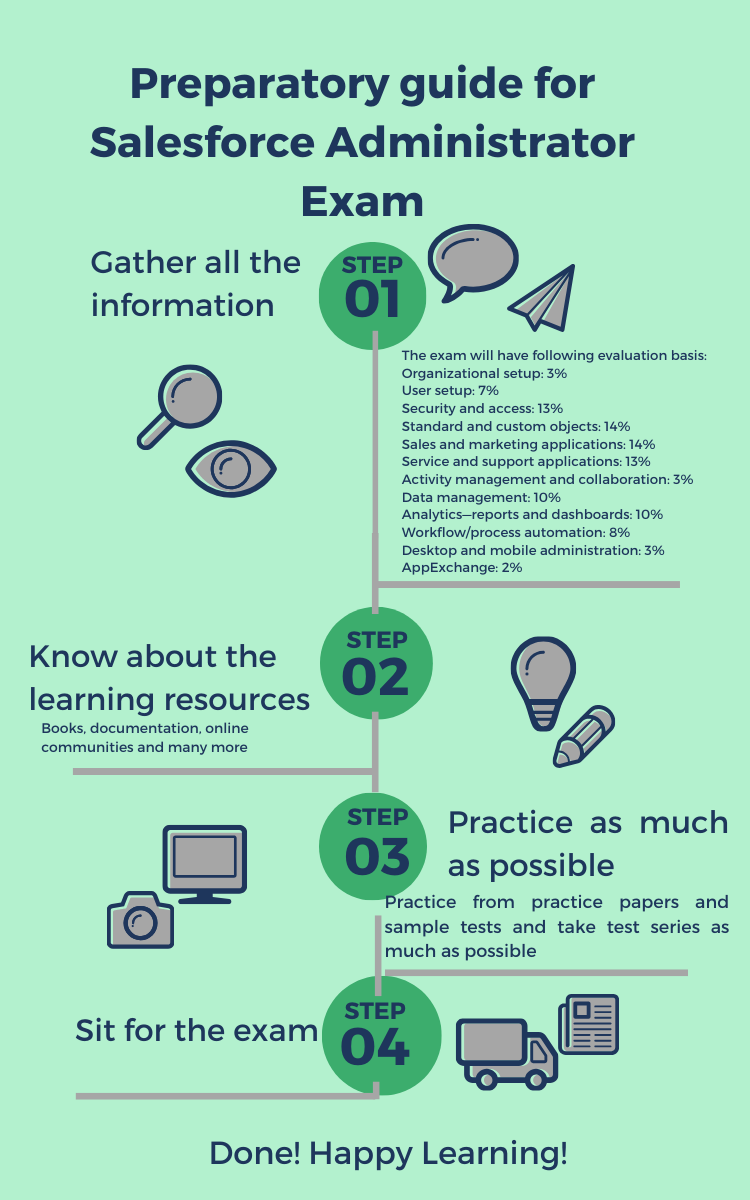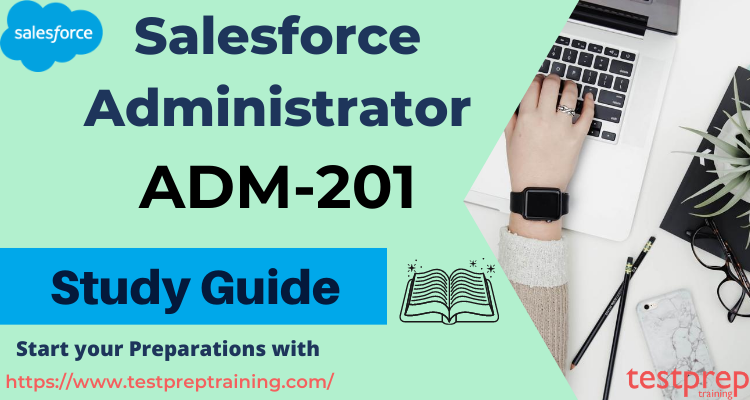Salesforce Administrator ( ADM-201) is a certification exam offered by Salesforce for professionals who want to become proficient in Salesforce administration. The exam assesses the candidate’s understanding and abilities in different aspects of Salesforce administration, including security, data handling, automation, and reporting.
The Salesforce Certified Administrator program offers two certificates. The first certification is that of a Salesforce Certified Administrator, which focuses on the capabilities and functionality required to manage a CRM deployment. The Salesforce Certified Advanced Administrator credential is the second one offered by the program. This certificate is intended for Salesforce Certified Administrators who have mastered Salesforce configuration maintenance, can articulate a grasp of administration best practices, and are proficient in using the advanced features and capabilities to address a range of business issues.
The exam evaluates a candidate’s understanding and abilities in handling and setting up the Salesforce platform. It includes subjects like managing users, ensuring security, customizing objects, dealing with data, and automation. Achieving the ADM-201 certification shows that the person possesses the necessary knowledge and skills to efficiently oversee a Salesforce setup.
Target Audience:
The Salesforce Administrator certification test is meant for people who already know Salesforce well and want to use its advanced features to benefit their organizations. It’s aimed at those with administrative roles in a Salesforce setup, where they configure and keep up Salesforce applications. The Salesforce Administrator (ADM-201) certification is meant for people who work as administrators in a Salesforce organization. These administrators are responsible for setting up and looking after Salesforce applications. This certification is also created for individuals who have a fundamental grasp of Salesforce and its primary functions, and they want to show their proficiency in this field.
Other targeted roles include:
The target audience for this exam includes:
- Salesforce Administrators: These are professionals who are responsible for managing and maintaining the Salesforce platform in their organizations.
- Business Analysts: These are experts who collaborate with business users to grasp their needs and transform them into solutions using Salesforce.
- Consultants: These are professionals who work for Salesforce implementation partners or consulting firms.
- IT professionals: These are professionals who have a background in IT and want to specialize in Salesforce administration.
Study Guide for Salesforce Administrator (ADM-201) Exam
There are many tools available to help you with your preparation, but you should pick the finest ones if you want to ace the test. Make sure the sources you pick provide you with a lot of practice and a solid conceptual grasp of the subjects while also being dependable in terms of substance. You can consult books, online training, instructor-led training, and test questions for the Salesforce administrator. All you need to remember is that only through practice will you be able to comprehend topics more clearly. Check out the following sources:

Step 1- Gather all information of Salesforce Administrator (ADM-201) Exam
Firstly, you must gather all the information about the exam. Therefore you must visit the official site of the Salesforce Administrator (ADM-201) exam. Familiarise yourself with the course outline. Also, it is recommended to have clarity about all the domains and subtopics of the exam. Give each subject considerable attention, and know it inside and out. Create a study schedule that is based on the exam’s course domains. The 12 domains covered by the Salesforce administrator test guide include:
Configuration and Setup: 20%
- Describe the information found in the company settings (for example: company settings fiscal year, business hours, currency management, default settings).
- Distinguish and understand the administration of declarative configuration of the User Interface. (for example: UI settings, app menu, list views, global actions, Lightning App Builder).
- Given a scenario, demonstrate the proper setup and maintenance of users.
- Explain the various organization Security Controls. (for example: Setup Audit Trail, Login Hours, Session Settings)
- Given a user request scenario, apply the appropriate security controls based on the features and capabilities of the Salesforce sharing model. (for example: public groups, org wide default, sharing: roles, subordinates, hierarchy, report and dashboard folders)
- Given a scenario, determine the appropriate use of a custom profile or permission set using the various profile settings and permissions.
Object Manager and Lightning App Builder: 20%
- Describe the standard object architecture and relationship model. (for example: standard object, parent/child, master detail/lookup/junction relationships, and record types.)
- Explain how to create, delete, and customize fields and page layouts on standard and custom objects, and know the implications of deleting fields.
- Given a scenario, determine how to create and assign page layouts, record types and business processes for custom and standard objects.
Sales and Marketing Applications: 12%
- Given a scenario, identify the capabilities and implications of the sales process. (for example: sales process, opportunity, path, and forecast impact.)
- Given a scenario, apply the appropriate sales productivity features using opportunity tools. (for example: dashboards, lead scoring, Einstein opportunity scoring, and home page assistant.)
- Describe the capabilities of lead automation tools and campaign management. (for example: leads, lead convert, lead assignment rules, campaign and campaign members.)
Service and Support Applications: 11%
- Describe the capabilities of case management. (for example: case, case assignment rules, and queues.)
- Given a scenario, identify how to automate case management. (for example: support process, case auto-response rules, and case escalation.)
Productivity and Collaboration: 7%
- Describe the capabilities of activity management.
- Describe the features of Chatter.
- Describe the capabilities of Salesforce Mobile App.
- Identify use cases for AppExchange applications.
Data and Analytics Management: 14%
- Describe the considerations when importing, updating, transferring, mass deleting, exporting and backing up data.
- Describe the capabilities and implications of data validation tools.
- Describe the options available when creating or customizing a report or report type.
- Describe the impact of the sharing model on reports.
- Describe the options available when creating and modifying dashboards (e.g., dashboard components, data sources, chart types, Subscribing, running user).
Workflow/Process Automation: 16%
- Given a scenario, identify the appropriate automation solution based on the capabilities of the tool.
- Describe capabilities and use cases for Flow.
- Describe capabilities and use cases for the approval process.
Step 2 – Know about the Learning Resources
There are a number of resources available both online and offline for Salesforce Administrator exam. Remember to refer the learning material from authentic and genuine sources.Being a practically oriented exam you should definitely have hands on experience. Here we list you some of these resources which will help you prepare better for the exam.
Books for Salesforce Administrator Exam

The first resource that springs to mind while studying for any sort of exam is undoubtedly a book. They are easily accessible, and we select books based on our comfort. Depending on your level of knowledge, you can consult a variety of books that are accessible in bookstores, libraries, and online retailers. Make sure the books you choose are accurate in their information and cover every subject included in the Salesforce administrator test curriculum. You can consult some of the books about Salesforce administration listed below:
- First, Salesforce Advanced Administrator Certification Guide: Become a Certified Advanced Salesforce Administrator with this exam guide
- Second, Salesforce CRM – The Definitive Admin Handbook: Build, configure, and customize Salesforce CRM and mobile solutions, 5th Edition
Trailblazer community – Online community
Online community is the best platform for asking your doubts related to the exam. there is no better guide than an experienced person, so, don’t be hesitant to ask your doubts related to the exam. you can also ask the people about their study strategy and other useful resources for the exam. Trailblazer community- this is an official community by salesforce so, this is one of the authentic sources.
Online classes and instructor led courses
There are many sites that are reliable enough in providing online classes and instructor-led training by world-class trainers. These trainers have complete knowledge of the subject and can be really helpful in gaining conceptual understanding and clearing the doubts. Even, salesforce has its own Salesforce administrator online training courses which are mentioned below-
- First, Trailmix: Prepare for Your Salesforce Administrator Credential
- Second, Trail: Study for the Administrator Certification Exam
- Third, Superbadge: Lightning Experience Reports & Dashboards Specialist
- Next, Superbadge: Business Administration Specialist
- Also, Superbadge: Security Specialist
The expert-led courses recommended for this exam include:
- Firstly, Administration Essentials for New Admins (ADM-201)
- Secondly, Administration Essentials for New Administrators in Lightning Experience and Certification (ADX-201C)
- Thirdly, Preparing for Your Salesforce Administrator Certification (CRT-101)
- Also, Administrative Essentials for New Admins in Lightning Experience (ADX-201)
- Then, Lightning Experience Administrative Essentials for New Admins (ADX-201E)
- Lastly, Trailhead Virtual Bootcamp for New Admins (SPP201)
Step 3 – Self Evaluate with Practice Tests
Once you’ve finished studying the material, it’s important to practice extensively to succeed in the exam. Since the exam is not easy, thorough preparation is crucial. Utilizing Salesforce administrator practice tests can help you pinpoint areas where you need improvement. These tests simulate the actual exam conditions, allowing you to practice your speed and accuracy. Furthermore, taking multiple tests will increase your confidence. Attempt a free Salesforce administrator practice test to self evaluate your preparations!
Exam Tips
Here are some tips for preparing for the Salesforce Administrator (ADM-201) exam:
- Study the Salesforce Administrator Study Guide: This guide covers all the topics that may be covered in the exam and can be found on the Salesforce website.
- Take practice exams: Salesforce offers practice exams and sample questions to help you prepare for the real exam.
- Join a study group: You can find various online Salesforce study groups and communities where you can interact with others who are also getting ready for the exam and gain insights from their experiences.
- Get hands-on experience: The best way to prepare for the ADM-201 exam is to work with Salesforce on a regular basis. This will help you get hands-on experience with the platform and understand how the various features and functions work.
- Stay current: Stay up-to-date with the latest features and updates in Salesforce by regularly reading the release notes and attending webinars and training sessions.
- Know the exam format: The ADM-201 exam contains 60 multiple-choice questions, and you have 105 minutes to finish it. It’s important to understand how the exam is structured so you can manage your time well and answer the questions efficiently.
- Relax: Don’t stress out! Get enough rest, eat well, and avoid cramming before the exam. Be confident in your knowledge and trust in your preparation.



